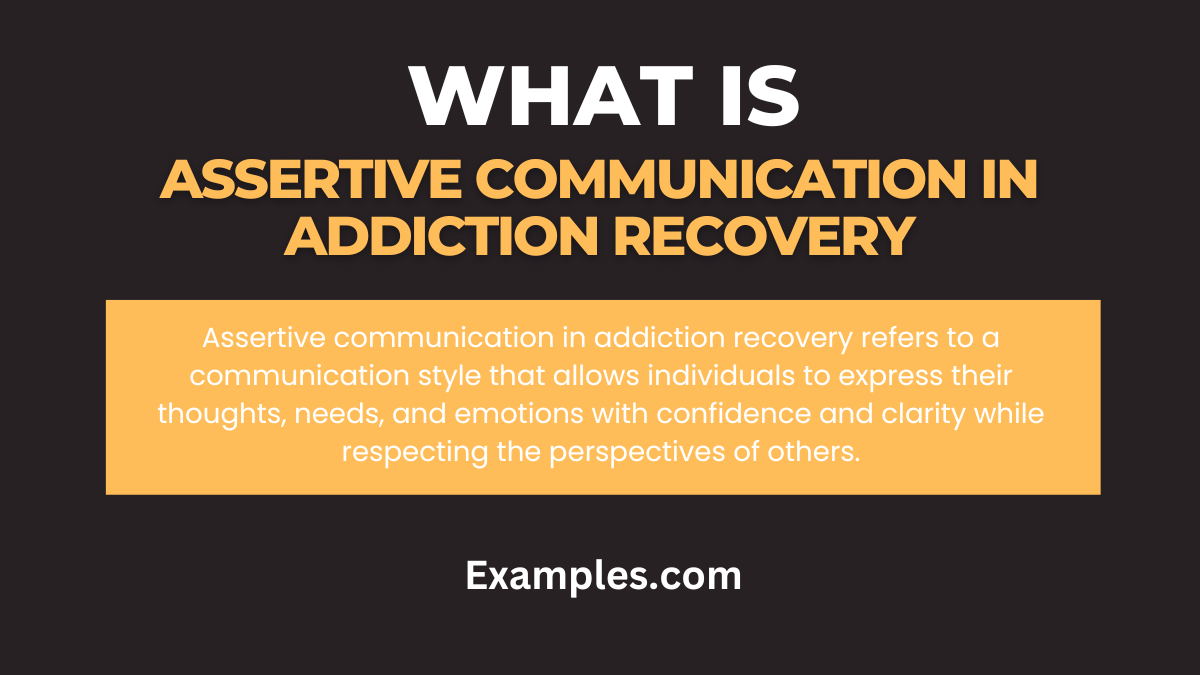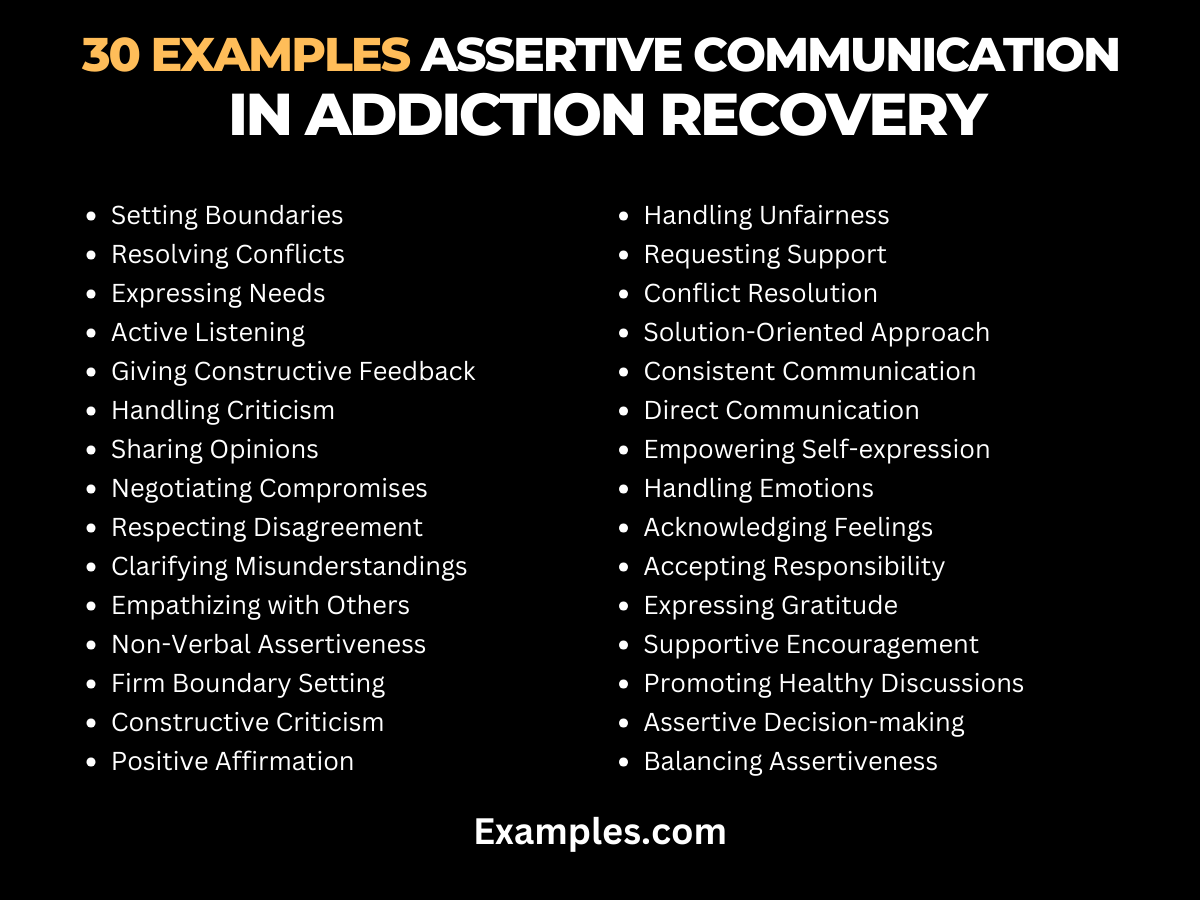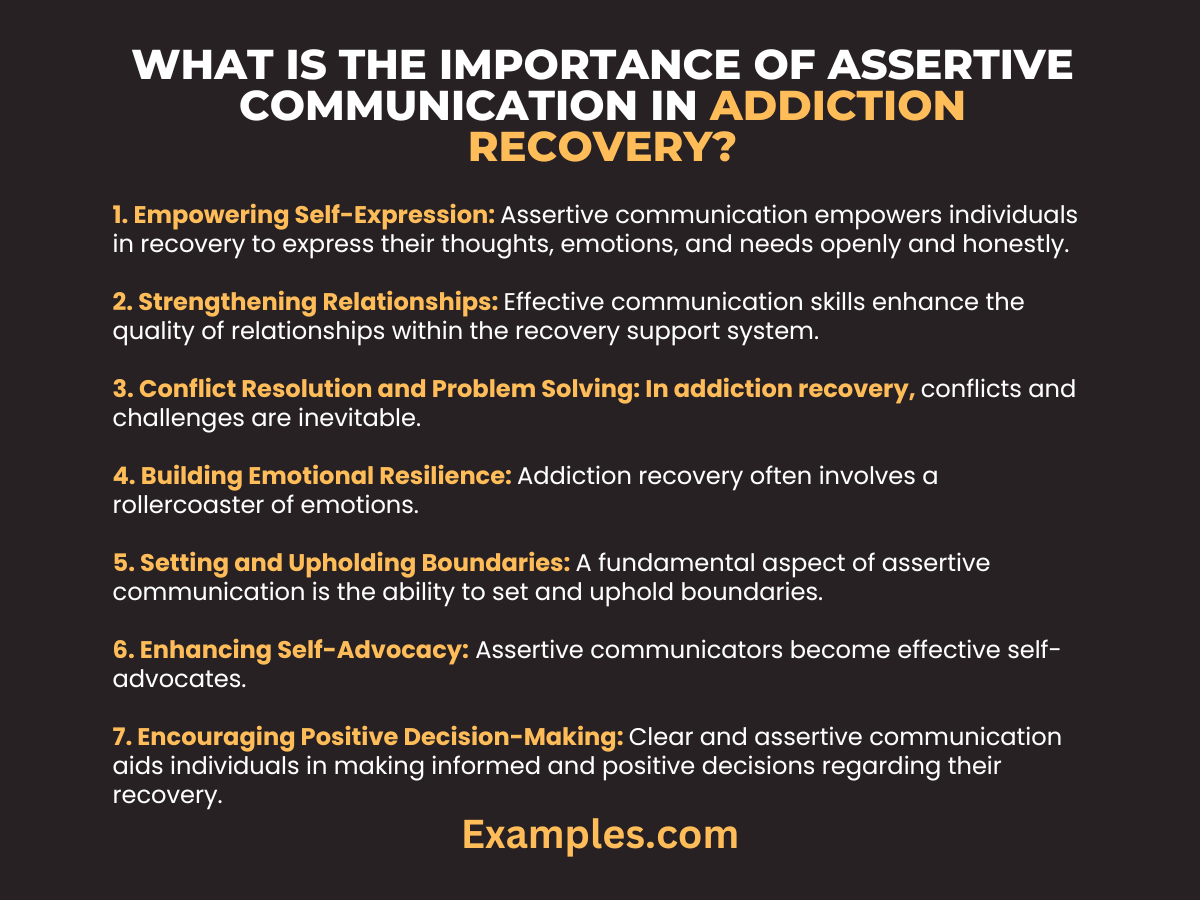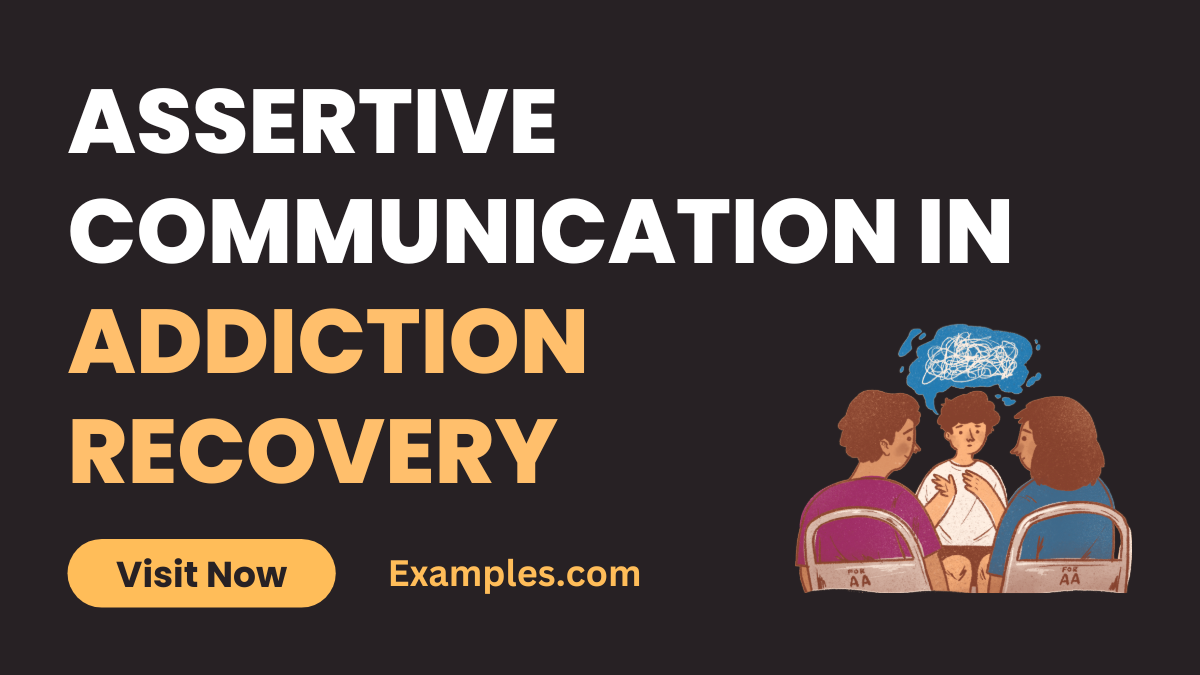Assertive Communication in Addiction Recovery
Embark on a transformative journey with Assertive Communication in Addiction Recovery. Delve into the profound definition, discover its historical roots, and grasp the origin of this empowering communication style. Uncover practical examples that illuminate the path to recovery, and learn essential tips on implementation. This guide goes beyond theory, providing actionable insights on how to embrace assertive communication effectively. Elevate your recovery experience by mastering this invaluable skill set – a beacon of strength, support, and lasting change.
What is Assertive Communication in Addiction Recovery?

Assertive communication in addiction recovery refers to a communication style that allows individuals to express their thoughts, needs, and emotions with confidence and clarity while respecting the perspectives of others. It involves open and honest expression, emphasizing active listening, clear articulation, and the setting of healthy boundaries. This assertiveness fosters healthier relationships and empowers individuals on their recovery journey.
30 Examples Assertive Communication in Addiction Recovery

Discover the transformative power of assertive communication in addiction recovery! Learn key skills and techniques to express yourself effectively, setting boundaries, resolving conflicts, and fostering healthier relationships. Explore actionable tips and proven strategies, empowering your journey towards lasting recovery with clarity, respect, and confidence.
- Setting Boundaries: Declining social invitations to prioritize personal recovery needs respectfully.
- Resolving Conflicts: Addressing disagreements with a calm and composed demeanor for constructive resolutions.
- Expressing Needs: Clearly communicating needs for support from loved ones during challenging times.
- Active Listening: Engaging in empathetic listening to understand others’ perspectives without judgment.
- Giving Constructive Feedback: Offering feedback in a respectful and solution-oriented manner for growth.
- Handling Criticism: Responding calmly to criticism, seeking clarity, and embracing opportunities for improvement.
- Sharing Opinions: Expressing opinions honestly while acknowledging diverse perspectives respectfully.
- Negotiating Compromises: Collaborating with others to find mutually beneficial solutions to conflicts.
- Respecting Disagreement: Acknowledging differing viewpoints with respect and openness in discussions.
- Clarifying Misunderstandings: Addressing misconceptions with patience and clarity for mutual understanding.
- Empathizing with Others: Showing empathy towards others’ challenges and offering genuine support.
- Non-Verbal Assertiveness: Using confident body language to convey assertiveness in conversations.
- Firm Boundary Setting: Clearly defining personal boundaries and asserting them in various situations.
- Constructive Criticism: Providing feedback in a constructive manner to encourage growth and improvement.
- Positive Affirmation: Offering encouragement and support to reinforce positive behaviors and choices.
- Handling Unfairness: Addressing unfair treatment calmly while seeking resolution or clarity.
- Requesting Support: Asking for help or assistance when facing overwhelming situations without hesitation.
- Conflict Resolution: Utilizing problem-solving skills to resolve conflicts amicably and positively.
- Solution-Oriented Approach: Focusing on finding solutions rather than dwelling on problems in discussions.
- Consistent Communication: Maintaining consistent and open communication with support networks.
- Direct Communication: Expressing thoughts and feelings directly and respectfully without ambiguity.
- Empowering Self-expression: Encouraging oneself and others to voice opinions and emotions freely.
- Handling Emotions: Managing emotions effectively to communicate without aggression or hostility.
- Acknowledging Feelings: Validating one’s feelings while expressing them assertively.
- Accepting Responsibility: Taking accountability for actions and expressing remorse or apologies assertively.
- Expressing Gratitude: Communicating appreciation and gratitude towards supportive individuals.
- Supportive Encouragement: Offering encouragement and support to those struggling in recovery journeys.
- Promoting Healthy Discussions: Creating an atmosphere that encourages open, respectful dialogues.
- Assertive Decision-making: Expressing opinions confidently and decisively in decision-making processes.
- Balancing Assertiveness: Striking a balance between assertiveness and empathy in communication styles for effective interactions.
Assertive Communication in Addiction Recovery for Clients
Assertive communication plays a pivotal role in addiction recovery for clients, providing a foundation for effective interpersonal interactions and self-expression. This comprehensive guide explores the significance of assertive communication skills and offers practical strategies tailored to clients navigating the challenges of addiction recovery.
Key Components of Assertive Communication:
- Active Listening: Developing the ability to listen empathetically and understand others’ perspectives without judgment.
- Clear Expression: Mastering the art of articulating thoughts and emotions with clarity and honesty.
- Respectful Tone: Communicating assertively while maintaining a respectful and considerate tone.
- Empathy: Cultivating empathy towards oneself and others, fostering a supportive environment.
Practical Tips for Clients:
- Self-Advocacy: Encourage clients to advocate for their needs and preferences in treatment plans.
- Boundary Setting: Guide them in establishing clear and healthy boundaries to protect their well-being.
- Conflict Resolution: Equip clients with skills to navigate conflicts constructively, promoting positive interactions.
- Emotional Regulation: Teach techniques for managing emotions to communicate assertively even in challenging situations.
Benefits of Assertive Communication in Recovery:
- Enhanced Self-Esteem: Clients experience a boost in self-esteem as they assertively express themselves.
- Improved Relationships: Healthy communication strengthens relationships with peers, family, and support networks.
- Empowerment: Clients feel empowered to actively engage in their recovery process, contributing to positive outcomes.
Assertive Communication in Addiction Recovery for Training
Effective communication skills are crucial for individuals navigating the challenging path of addiction recovery. This comprehensive guide focuses on harnessing assertive communication within a training framework, empowering individuals to express themselves confidently and foster a supportive environment for lasting recovery.
1. Understanding the Role of Assertive Communication in Recovery Training: Incorporating assertive communication skills into addiction recovery training lays the foundation for positive transformation. Explore how clear expression, active listening, and empathetic communication contribute to building resilience and self-advocacy.
2. Tailoring Training Programs for Assertive Communication Mastery: Designing training programs that emphasize assertive communication involves targeted exercises and real-life scenarios. Integrate interactive workshops, role-playing, and group discussions to enhance participants’ skills in setting boundaries, resolving conflicts, and expressing needs assertively.
3. Active Listening Techniques in Addiction Recovery Training: Trainees learn the art of active listening as a cornerstone of assertive communication. Explore techniques that foster genuine understanding, empathy, and connection, enabling individuals to navigate recovery challenges with improved interpersonal communication.
4. Role of Constructive Feedback in Assertive Communication Training: Incorporating constructive feedback into training sessions empowers individuals to grow and refine their communication skills. Explore how providing and receiving feedback positively contributes to personal development, fostering a culture of continuous improvement.
5. Building Confidence through Assertive Communication Training: Boosting confidence is integral to effective communication in addiction recovery. Discover strategies within training programs that encourage individuals to express themselves assertively, fostering self-assurance and a positive self-image.
Honest Assertive Communication in Addiction Recovery
Honest assertive communication plays a pivotal role in addiction recovery, fostering genuine connections and empowering individuals on their journey to sobriety. This comprehensive guide explores the significance of honesty within assertive communication and provides practical insights for its effective implementation.
Understanding Honest Assertive Communication in Addiction Recovery: In addiction recovery, honest assertive communication involves expressing thoughts, feelings, and needs truthfully while maintaining a respectful tone. It forms the bedrock of trust-building and cultivates an environment conducive to open dialogue.
The Importance of Honesty in Assertive Communication: Honesty serves as the cornerstone of assertive communication by promoting transparency and authenticity. In addiction recovery, being honest about one’s experiences, challenges, and aspirations fosters a supportive community, essential for sustained recovery.
Key Elements of Honest Assertive Communication
- Openness and Transparency: Embrace openness in expressing personal experiences and challenges, creating an environment where others feel comfortable doing the same.
- Sincerity in Expression: Communicate with sincerity, avoiding deceit or manipulation, to build trust and authenticity within the recovery community.
- Acknowledging Vulnerability: Honest assertive communication involves acknowledging vulnerability, allowing for genuine connections with others going through similar struggles.
- Sharing Personal Experiences: Share personal recovery experiences honestly, contributing to the collective wisdom and providing inspiration for others.
Implementing Honest Assertive Communication Skills
- I Statements for Honesty: Utilize “I statements” to express personal feelings and thoughts honestly, promoting self-expression without blame.
- Active Listening and Honesty: Combine active listening skills with honesty to create a reciprocal environment where everyone feels heard and understood.
- Empathy and Truthfulness: Integrate empathy into honest communication, demonstrating understanding while maintaining truthfulness in interactions.
Overcoming Challenges in Honesty within Assertive Communication
- Fear of Judgment: Address the fear of judgment by emphasizing the shared goal of recovery and the understanding nature of the recovery community.
- Cultural Stigmas: Navigate cultural stigmas by emphasizing the universal need for honesty in fostering supportive relationships within the recovery journey.
Benefits of Honest Assertive Communication in Addiction Recovery
- Trust Building: Honest communication builds trust among individuals in recovery, creating a supportive network essential for overcoming challenges.
- Emotional Release and Healing: Sharing honest experiences allows for emotional release, contributing to healing and the development of coping mechanisms.
- Community Support: Fostering honesty within assertive communication creates a community where individuals feel supported, reducing feelings of isolation.
What is the Importance of Assertive Communication in Addiction Recovery?

Assertive communication plays a pivotal role in the journey of addiction recovery, offering individuals a powerful tool to navigate challenges and foster positive change. Here’s an in-depth exploration of its significance:
1. Empowering Self-Expression: Assertive communication empowers individuals in recovery to express their thoughts, emotions, and needs openly and honestly. This self-expression is crucial for building self-awareness and addressing underlying issues contributing to addiction.
2. Strengthening Relationships: Effective communication skills enhance the quality of relationships within the recovery support system. By fostering mutual understanding, trust, and respect, assertive communication helps individuals forge meaningful connections that contribute positively to their recovery.
3. Conflict Resolution and Problem Solving: In addiction recovery, conflicts and challenges are inevitable. Assertive communication equips individuals with the skills to navigate conflicts calmly, seeking constructive resolutions. This proactive problem-solving approach aids in maintaining stability and focus on recovery goals.
4. Building Emotional Resilience: Addiction recovery often involves a rollercoaster of emotions. Assertive communication encourages the acknowledgment and healthy expression of emotions, contributing to emotional resilience. Individuals learn to manage stress, frustration, and other emotions without resorting to destructive coping mechanisms.
5. Setting and Upholding Boundaries: A fundamental aspect of assertive communication is the ability to set and uphold boundaries. This skill is essential in creating a supportive environment that promotes recovery, as individuals learn to prioritize their well-being and resist external pressures or triggers.
6. Enhancing Self-Advocacy: Assertive communicators become effective self-advocates. This skill is crucial in seeking the necessary support, resources, and accommodations for a successful recovery journey. Individuals learn to articulate their needs, ensuring they receive appropriate assistance.
7. Encouraging Positive Decision-Making: Clear and assertive communication aids individuals in making informed and positive decisions regarding their recovery. It cultivates a sense of agency, enabling them to actively participate in treatment plans and make choices that align with their long-term well-being.
8. Improving Active Listening Skills: Effective communication involves not just expressing oneself but also active listening. Assertive communication promotes active listening, fostering a deeper understanding of others’ perspectives and creating a supportive community where everyone’s voice is heard.
9. Reducing Misunderstandings: Miscommunication can lead to misunderstandings that may hinder the recovery process. Assertive communication minimizes the risk of misinterpretation, as individuals learn to express themselves clearly, reducing the likelihood of conflicts arising from misunderstandings.
10. Building Confidence and Self-Esteem: Mastering assertive communication boosts individuals’ confidence and self-esteem. As they experience successful interactions and navigate challenges effectively, they develop a positive self-image, reinforcing their belief in their ability to overcome obstacles in their recovery journey.
What are Proven Benefits of Assertive Communication in Addiction Recovery?
Assertive communication plays a pivotal role in addiction recovery, offering a multitude of proven benefits that contribute to a successful and sustainable journey towards healing.
- Enhanced Self-Efficacy: Assertive communication empowers individuals in recovery by boosting self-esteem and confidence, fostering a belief in their ability to navigate challenges.
- Strengthened Relationships: Building on clear expression and respectful dialogue, assertive communication fosters healthier connections, repairing and fortifying relationships strained by addiction.
- Effective Conflict Resolution: Assertiveness equips individuals with the skills to resolve conflicts constructively, promoting understanding and collaboration within support networks.
- Reduced Stress Levels: By providing a structured approach to communication, assertiveness helps manage stress, preventing overwhelming emotions that can trigger relapses.
- Improved Emotional Regulation: Assertive communication encourages individuals to express emotions openly, contributing to better emotional control and a more balanced mental state.
- Enhanced Decision-Making: Clarity in expression facilitates effective decision-making, allowing individuals in recovery to make informed choices that align with their goals.
- Establishment of Healthy Boundaries: Assertiveness enables the setting and maintenance of healthy boundaries, crucial for maintaining a supportive and conducive environment for recovery.
- Increased Self-Awareness: Through honest and open communication, individuals gain deeper insights into their emotions, thoughts, and behaviors, fostering self-awareness.
- Empowerment in Expressing Needs: Assertiveness teaches individuals how to articulate their needs confidently, ensuring they receive the support necessary for a successful recovery.
- Promotion of Personal Growth: The constructive feedback loop created by assertive communication encourages continuous personal development and learning.
In conclusion, assertive communication is a vital tool in addiction recovery, offering a path toward building healthier relationships and a stronger sense of self. It’s about speaking up for one’s needs and feelings while also respecting others. This approach not only aids in personal growth but also contributes significantly to sustaining recovery. For those interested in delving deeper into the practical application of these skills, two valuable resources are recommended.
Firstly, the Substance Abuse and Mental Health Services Administration (SAMHSA) provides comprehensive information on addiction recovery and mental health. Their resources on communication strategies can be especially beneficial for those in recovery. Secondly, Psychology Today’s section on Addiction offers insightful articles and expert opinions that can further enhance understanding and application of assertive communication in the context of addiction recovery. These sources are not only authoritative but also directly relevant to the article’s topic, thereby enriching the reader’s knowledge and resource base.



